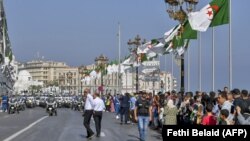This week's summit, postponed several times due to the coronavirus pandemic, coincides with elections in Israel that could see hawkish ex-premier Benjamin Netanyahu return to power with his far-right allies.
Since the last Arab League summit in 2019, several members of the 22-member bloc -- for decades a forum for strident declarations of support for the Palestinian cause -- have normalized ties with the Jewish state.
The United Arab Emirates went first in a historic US-mediated deal that made the country the third Arab state, after Egypt and Jordan, to establish full ties with Israel.
The UAE's move sparked similar accords with Bahrain and Morocco -- and a provisional agreement with Sudan -- deepening Morocco's decades-old rivalry with its neighbor Algeria.
Algeria has also been unnerved by Morocco's security and defense cooperation with Israel, adding to decades of mistrust fueled by a dispute over the Western Sahara.
The status of Western Sahara -- a former Spanish colony considered a "non-self-governing territory" by the United Nations -- has pitted Morocco against the Algeria-backed Polisario Front since the 1970s.
In August 2021, Algiers cut diplomatic ties with Rabat alleging "hostile acts."
Another source of controversy has been Algeria's efforts to bring Syrian President Bashar al-Assad's regime back into the Arab League, a decade after its membership was suspended amid a brutal crackdown on 2011 Arab Spring-inspired protests.
President Vladimir Putin, Assad's key backer, sent a message saying Russia was committed to cooperation with the league to boost "security".
Putin called for conflicts "be resolved on the basis of generally accepted international law and a commitment to strict respect for the sovereignty and territorial integrity of countries."
Pierre Boussel of France's Foundation for Strategic Research (FRS) said Russia backed Syria's return but had decided not to force it through "in a way that would have affected its relations with Arab countries already badly scalded by the economic impact of the Ukrainian conflict".
With conflicts in Syria, Libya and Yemen also on the agenda, sources say foreign ministers are trying to reach consensus on the wording around Turkish and Iranian "interference" in the region -- and whether to mention Ankara and Tehran by name or not.
"Algerian foreign policy has gone on the offensive at the regional, African and Arab levels," said Geneva-based expert Hasni Abidi.
"The paradox of this summit is that it's being billed as a unifying event, whereas each Arab state actually has its own agenda and goals fitting its interests," Abidi said.
"So ultimately the Arab League is the perfect mirror of Arab foreign policy."
Algeria remains a steadfast supporter of the Palestinians, even mediating a reconciliation deal in October between rival factions Fatah and Hamas.
While few believe the deal will last, it was seen as a public relations coup for Algeria, which has been seeking more regional clout on the back of its growing status as a gas exporter following Russia's invasion of Ukraine.
This week's summit is another opportunity for President Abdelmadjid Tebboune to push that agenda forward, despite high-profile Arab leaders being absent from the summit.




